Understanding the Power of Writing in Recovery
In the journey of addiction recovery, individuals often encounter numerous physical and emotional challenges. Finding tools that support healing and foster personal growth is crucial. Writing therapy has emerged as an effective method to aid in this recovery process by providing a safe outlet for emotional expression and enhancing self-awareness. Through various techniques and therapeutic exercises, writing therapy can lead to profound changes in individuals’ recovery journeys, offering both psychological and physiological benefits.
Exploring the Purpose of Writing Therapy in Recovery
What is the purpose of writing therapy in addiction recovery?
The purpose of writing therapy in addiction recovery is to provide individuals with a space to express and process their emotions related to their experiences with addiction. Therapeutic journaling promotes self-understanding and emotional health, allowing individuals to construct meaningful narratives about their struggles. Research has shown that expressive writing can lead to significant health benefits, including reduced symptoms of PTSD and depression, which are common in those recovering from addiction.
Writing therapy encourages individuals to articulate their thoughts and feelings on paper, enhancing resilience and self-regulation. The act of writing enables them to confront uncomfortable emotions tied to their experiences, fostering a deeper understanding of their past and present.
What research supports the effectiveness of writing therapy?
A randomized clinical trial conducted with 149 women in addiction treatment demonstrated that expressive writing leads to greater reductions in post-traumatic symptom severity, depression, and anxiety compared to control writing. Participants who engaged in expressive writing showed significant decreases in trauma symptom severity at a 2-week follow-up, suggesting that writing about painful experiences aids emotional regulation.
Long-term benefits mentioned in various studies include improved immune function, reduced blood pressure, and enhanced overall mood, confirming that journaling has proven impacts on both mental and physical health in recovery contexts.
What are some health benefits of expressive writing?
Expressive writing confers numerous health benefits that are especially vital for individuals in recovery from addiction. These benefits include:
| Health Benefits | Description |
|---|---|
| Improved mood | Engaging in regular writing can elevate one’s mood by processing negative emotions. |
| Enhanced immune system function | Writing therapeutically strengthens immune responses, promoting overall physical health. |
| Reduced blood pressure | Participants in writing studies often report lower blood pressure levels. |
| Fewer hospital visits | Better emotional health can lead to decreased need for medical care. |
| Increased self-awareness | Journaling allows individuals to reflect on their thoughts and emotions, boosting insight. |
Overall, writing therapy serves as a valuable tool in integrating emotional and physical health, facilitating healing and personal growth in addiction recovery.
How Writing Therapy Aids in the Recovery Process
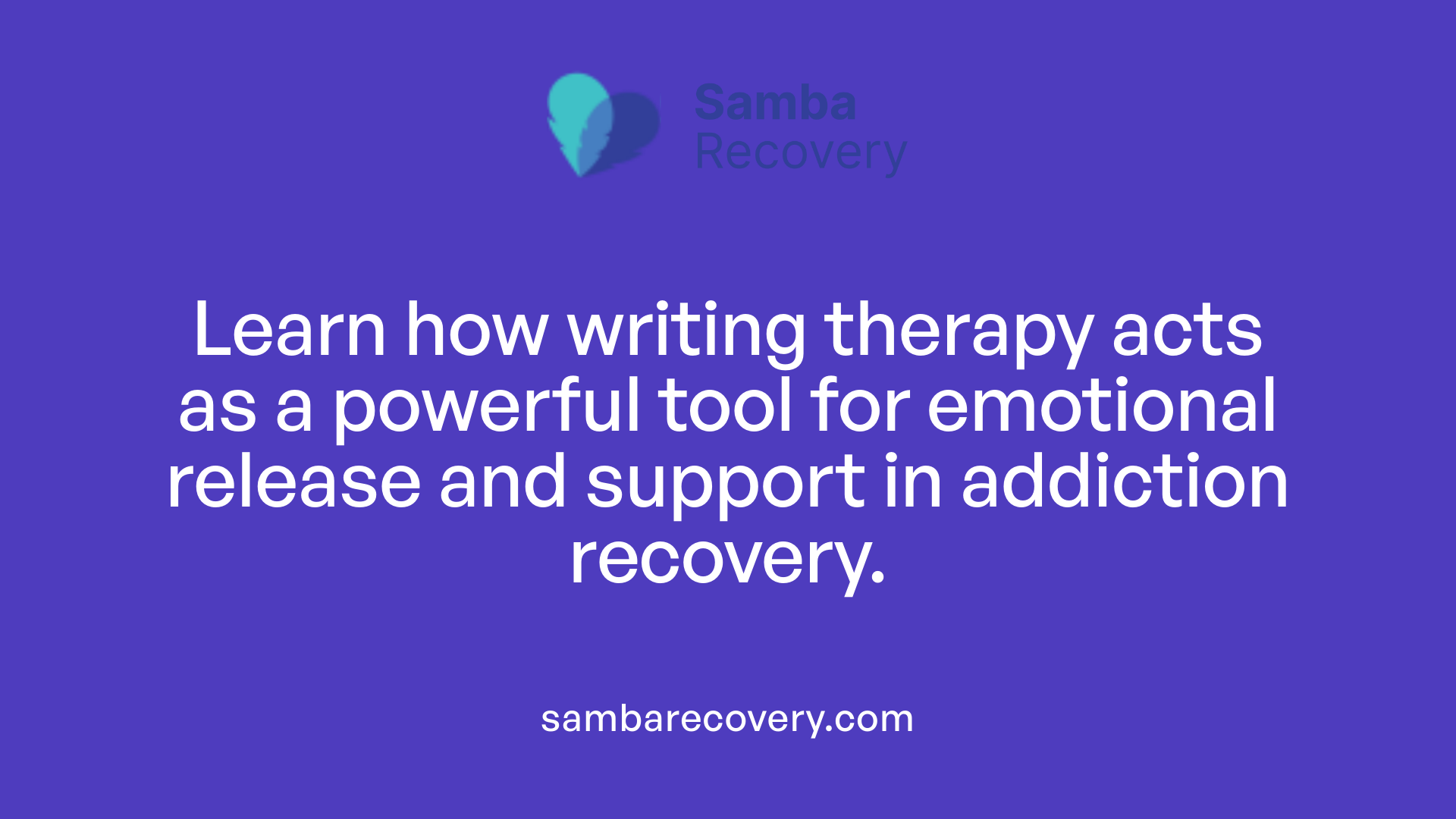
How does writing therapy aid in addiction recovery?
Writing therapy provides a unique outlet that significantly supports individuals undergoing addiction recovery. Through expressive writing, individuals can access their inner selves and articulate complex emotions, fostering positive change. This cathartic process enables them to explore difficult feelings without resorting to substance use, effectively serving as an emotional release.
Emotional intelligence through writing
Engaging in writing enhances emotional intelligence by allowing individuals to confront feelings of sadness, anger, and guilt. This self-reflection helps identify emotional triggers and encourages introspection, enabling users to navigate their challenges with greater clarity. For example, individuals might write about their daily experiences, slowly unpacking deeper emotional layers often suppressed due to addiction.
Mindfulness and self-awareness
Journaling promotes mindfulness by encouraging individuals to stay present and focus on their emotional states. It cultivates self-awareness, which is crucial in recognizing harmful patterns and triggers that may lead to relapse. Writing tasks, such as gratitude journaling or daily reflections, keep individuals accountable for their emotional needs, facilitating ongoing growth and recovery.
Stress relief and accountability
The therapeutic act of writing also provides a release from stressors and anxiety, which are common challenges in recovery. By documenting thoughts and feelings, individuals can alleviate mental chaos, leading to improved clarity and peace of mind. Furthermore, maintaining a writing routine serves as a reliable method for tracking progress, setting goals, and reinforcing a commitment to recovery, ultimately enhancing the likelihood of lasting sobriety.
The Importance of Journaling in Addiction Recovery
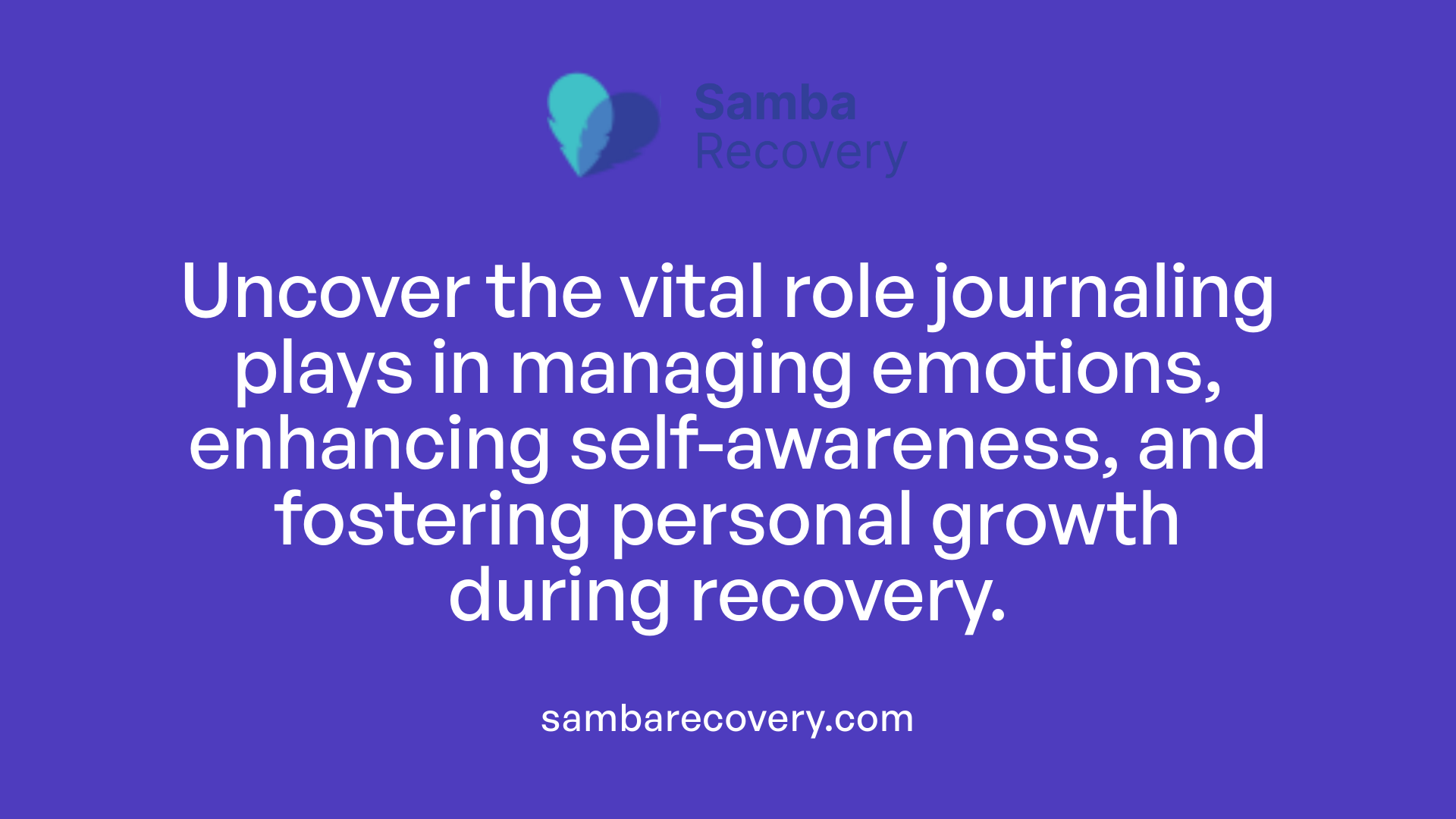
Why is journaling important in recovery?
Journaling is a vital tool in the recovery process because it provides a structured avenue for individuals to articulate their thoughts and emotions. By writing down feelings, individuals can better manage stress and confront emotions that may lead to substance cravings.
The act of putting pen to paper allows for a clearer understanding of overwhelming feelings. It also promotes problem-solving skills, enabling individuals to navigate emotional challenges more effectively. For example, keeping a daily gratitude journal can significantly enhance emotional well-being, fostering positivity and improving interpersonal relationships.
Journaling has no set rules, giving individuals the freedom to express themselves creatively and personally. This lack of pressure encourages authenticity and self-exploration, making the writing experience more fulfilling.
Moreover, integrating a recovery journal into one’s routine can complement other recovery methods, such as therapy sessions and support apps. This multifaceted approach strengthens the support network essential for successful addiction recovery.
Structured expression and stress management
Using journaling as a structured expression method helps individuals articulate their experiences in a way that manages stress effectively. Individuals can set aside dedicated time for writing, allowing an emotional release and helping to sort through racing thoughts. This practice can mitigate anxiety and improve focus on recovery goals, important elements in overcoming addiction.
Enhancing emotional well-being
Journaling serves to enhance emotional awareness, prompting individuals to reflect on their feelings and assess triggers that could lead to relapse. Developing insight into these emotional responses can better equip individuals to handle challenges that arise during recovery.
Creative freedom in journaling
The creative freedom associated with journaling presents a unique opportunity for self-exploration. Individuals can express their narratives through various styles, such as poetry, letters, or straightforward reflections. This creative outlet not only allows a deeper understanding of personal experiences but also promotes resilience and confidence—a crucial component during the recovery journey.
| Topic | Description | Benefits of Journaling |
|———————————|————————————————————————————————————————————|———————————————————————-|
| Structured expression | Offers a way to organize thoughts and feelings in a digestible format. |
Aids in emotional management and stress relief. | Enhances focus on recovery
Manages emotions effectively |
| Enhancing emotional well-being | Encourages self-reflection and identification of triggers related to addiction. |
Prompts personal growth and insight. | Fosters emotional awareness
Promotes positive self-perception |
| Creative freedom | Provides an unstructured format for individual expression and creativity. |
Supports diverse writing styles and formats. | Rebuilds self-trust
Encourages confidence in expressing thoughts and emotions |
Starting Your Own Recovery Journal
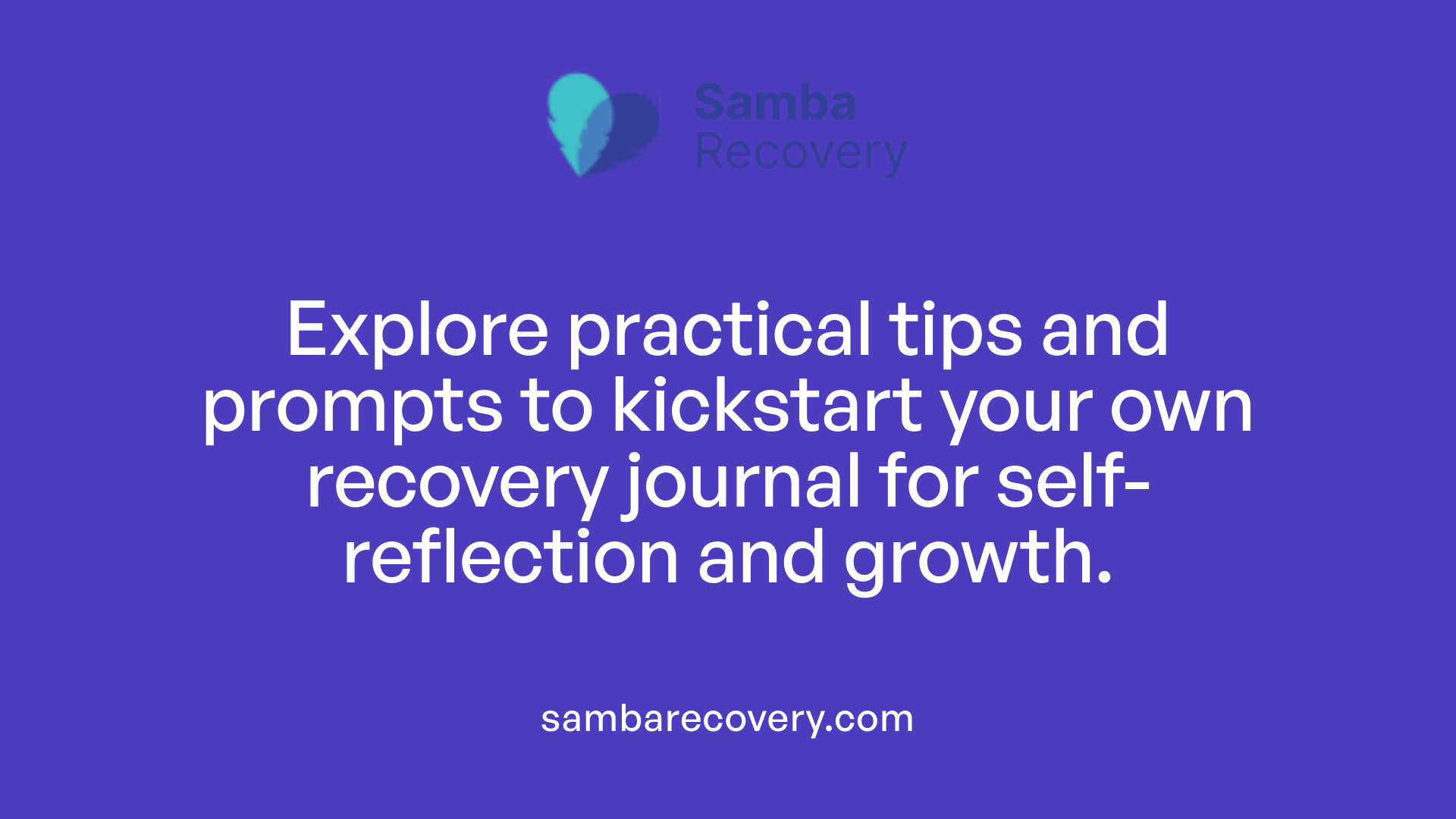
How can one start a recovery journal?
Starting a recovery journal can be a powerful process for self-reflection and growth. The first step is choosing a medium that feels comfortable, whether it’s a physical notebook, a digital app, or even audio recordings. The important part is to select a platform that allows you to express yourself freely.
Setting a regular time to write is equally crucial. Dedicating 15-20 minutes daily can significantly enhance the experience. During this time, focus on expressing your emotions and thoughts honestly, without worrying about the format or presentation. Consistency helps in building a habit, making journaling an integral part of your recovery routine.
Prompts for guiding journal entries
Using writing prompts can further enrich your journaling experience. Consider prompts such as:
- Reflecting on recent triggers you faced.
- Expressing gratitude for aspects of your life that bring joy.
- Writing letters to different versions of yourself to explore growth.
These prompts provide direction and encourage deeper reflection, making your entries more meaningful.
Reviewing progress and maintaining accountability
Over time, reviewing your journal not only helps in recognizing your progress but also in maintaining accountability in your recovery journey. Look back on earlier entries to see how your thoughts and feelings have evolved. This reflection can foster positive reinforcement and strengthen your commitment to sobriety, enabling you to identify achievements and areas for improvement along the way.
Techniques for Effective Writing Therapy
What are some techniques for effective writing therapy?
Effective writing therapy techniques encompass a variety of approaches that support self-exploration and emotional processing. Techniques like free writing and reflective journaling allow individuals to express their thoughts and feelings in a judgment-free environment, which is particularly beneficial during recovery from addiction.
Free Writing and Reflective Journaling
- Free Writing: This method encourages uninterrupted writing for a set time, allowing thoughts to flow freely. It cultivates creativity and emotional release, enabling individuals to confront their feelings without self-censorship.
- Reflective Journaling: Involves writing about daily experiences and feelings. This practice helps in understanding emotions and recognizing patterns that could influence addiction recovery.
Utilizing Prompts for Introspection
Incorporating specific journaling prompts can enhance the writing experience:
- Gratitude Journals: Encourages positivity by focusing on what one appreciates in life.
- Future Aspirations: Writing letters to future selves to explore dreams and goals can foster motivation.
- Addressing Negative Thoughts: Writing about challenging feelings and fears allows individuals to confront and reframe these negative perceptions.
Tracking Progress and Recognizing Patterns
Regular journaling not only promotes honesty with oneself but also helps individuals track their progress over time. This enables:
- Self-Discipline: Establishing a routine helps in maintaining recovery focus.
- Recognizing Harmful Thought Patterns: Writing facilitates identifying triggers and negative self-talk, crucial for preventing relapse.
Overall, writing therapy is a potent tool for emotional healing and personal growth, offering individuals a pathway to deeper insight into their recovery journey.
Integrating Writing into a Personal Recovery Plan
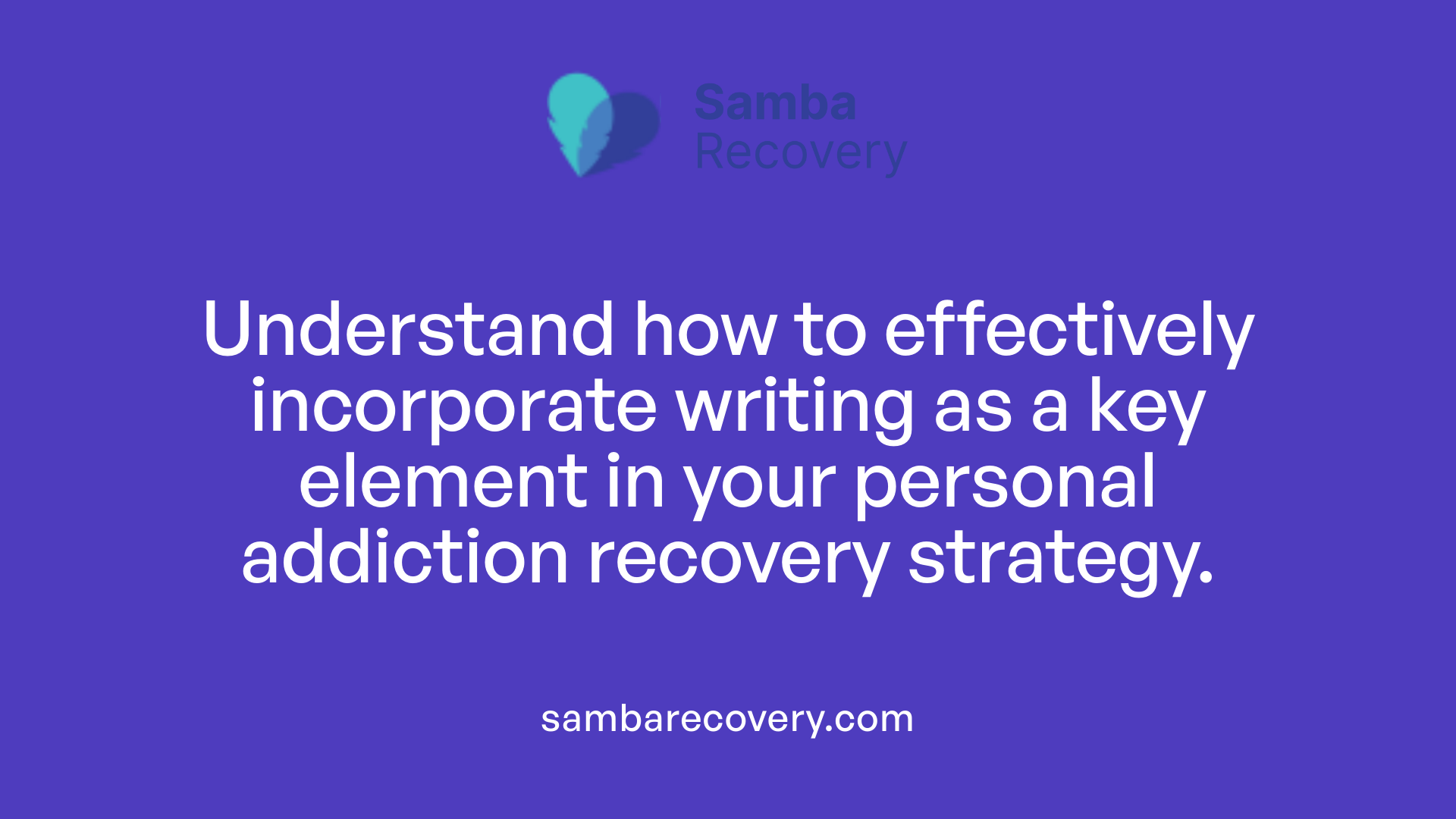
How can writing be integrated into a personal addiction recovery plan?
Writing serves as a profound tool in addiction recovery by facilitating self-expression and emotional processing. Engaging in expressive journaling encourages individuals to articulate their traumatic experiences and emotions. This practice promotes emotional processing, significantly reducing symptoms of anxiety and depression.
Fostering accountability and motivation is another key aspect of integrating writing into recovery. Individuals can maintain journals—such as gratitude or goal journals—to track their progress and heartily evaluate triggers that may lead to relapse. This reflection helps reinforce their commitment to sobriety by promoting self-awareness and accountability for their actions.
Creative writing exercises for personal growth
Creative writing exercises can further enhance personal growth through innovative and meaningful expression. Activities like writing letters to one’s future self or creating unsent letters allow individuals to process difficult emotions safely. Exercises such as "Three-Points in Time"—reflecting on the past, present, and future—can deepen self-awareness and foster a sense of community through shared experiences.
Overall, incorporating consistent writing practices not only supports emotional healing but also contributes to improved physical health and long-term sobriety, making it an invaluable aspect of a personal recovery plan.
The Psychological and Physiological Impact of Writing Therapy
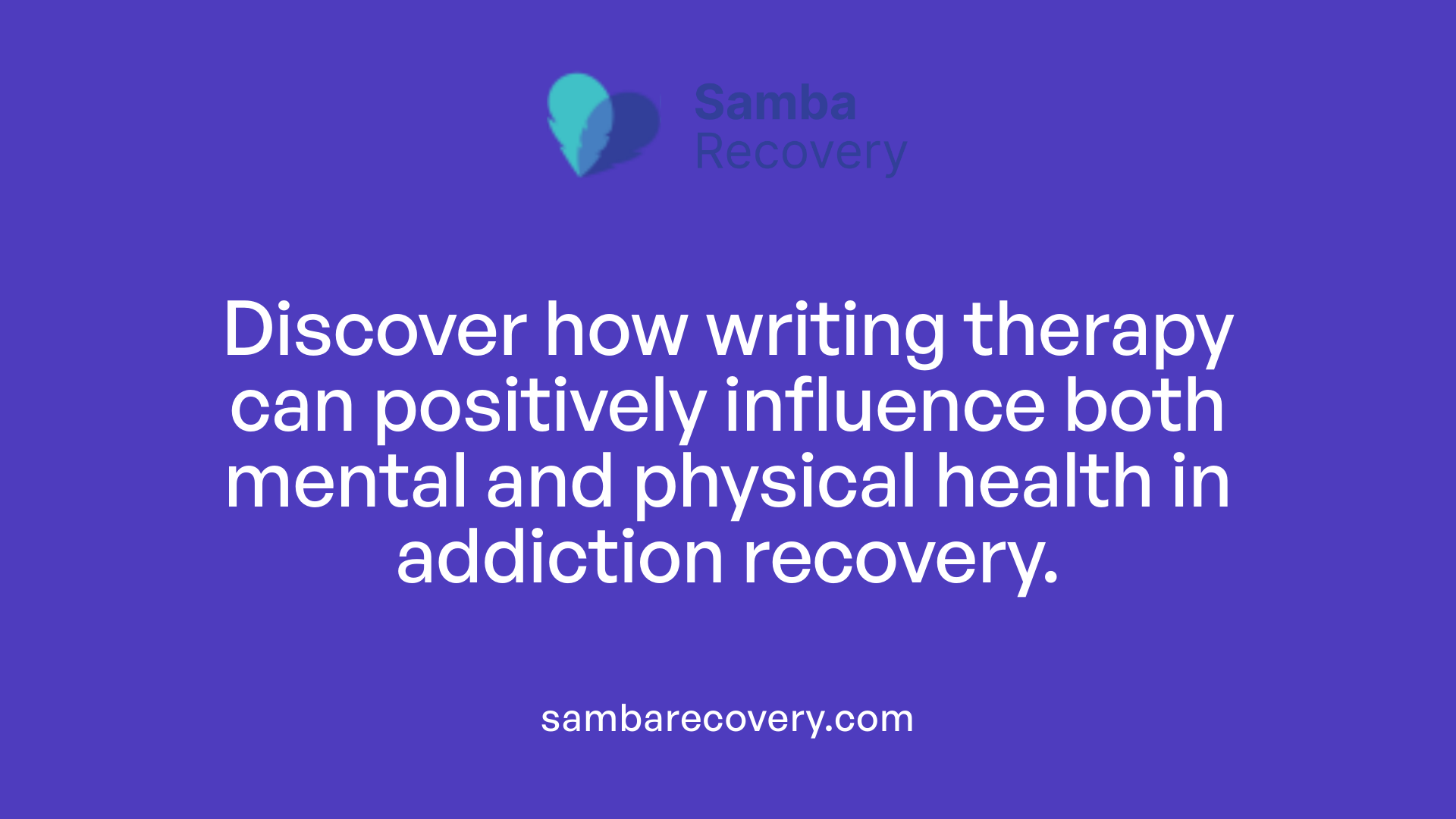
Research on Health Benefits of Writing Therapy
Writing therapy, particularly expressive writing, has demonstrated significant health benefits. A randomized clinical trial with 149 participants revealed that regular writing reduced post-traumatic symptoms, depression, and anxiety two weeks after the sessions. This suggests that dedicating even short periods for writing can facilitate emotional processing, aiding mental well-being.
Emotional and Physical Health Improvements
Beyond emotional advantages, writing also positively influences physical health. Individuals engaging in regular expressive writing have shown improvements in immune function, reduced blood pressure, and enhanced psychological health. The act of writing has even been correlated with fewer doctor visits and better overall health outcomes, which is critical for those in addiction recovery.
Long-Term Effects on Recovery
The long-term effects of writing therapy in recovery are promising. Research indicates that individuals who incorporate writing into their recovery routines experience decreased anxiety and increased emotional awareness. This method not only helps manage immediate stressors but also fosters introspection and accountability, vital for sustained sobriety. Writing acts as a continuous outlet for processing emotions and identifying triggers, supporting the journey towards healing effectively.
The Transformative Power of Writing in Recovery
Writing therapy presents a transformative opportunity for individuals on the path to addiction recovery. By offering a medium through which emotions and thoughts can be safely processed and expressed, writing acts not only as a tool for emotional catharsis but also as a means of fostering self-awareness and accountability. As research highlights its profound benefits in reducing symptoms of mental health disorders and improving overall health, integrating writing therapy into recovery plans can lead to long-lasting positive outcomes. With guided practice and consistency, writing becomes more than a therapeutic exercise; it forms a cornerstone of a healthier, addiction-free life.
References
- Expressive Writing as a Therapeutic Process for Drug Dependent …
- Using Writing to Further Your Recovery
- Therapeutic Benefits of Writing in Recovery
- Writing for Addiction Recovery | Psychology Today
- Benefits of Writing Therapy | 7 Summit Pathways
- The Power and Benefits Of Journaling In Addiction Recovery
- Impact of Creative Writing Therapy on Recovery
- Benefits of Writing Therapy Throughout Addiction Recovery – 12 Keys






